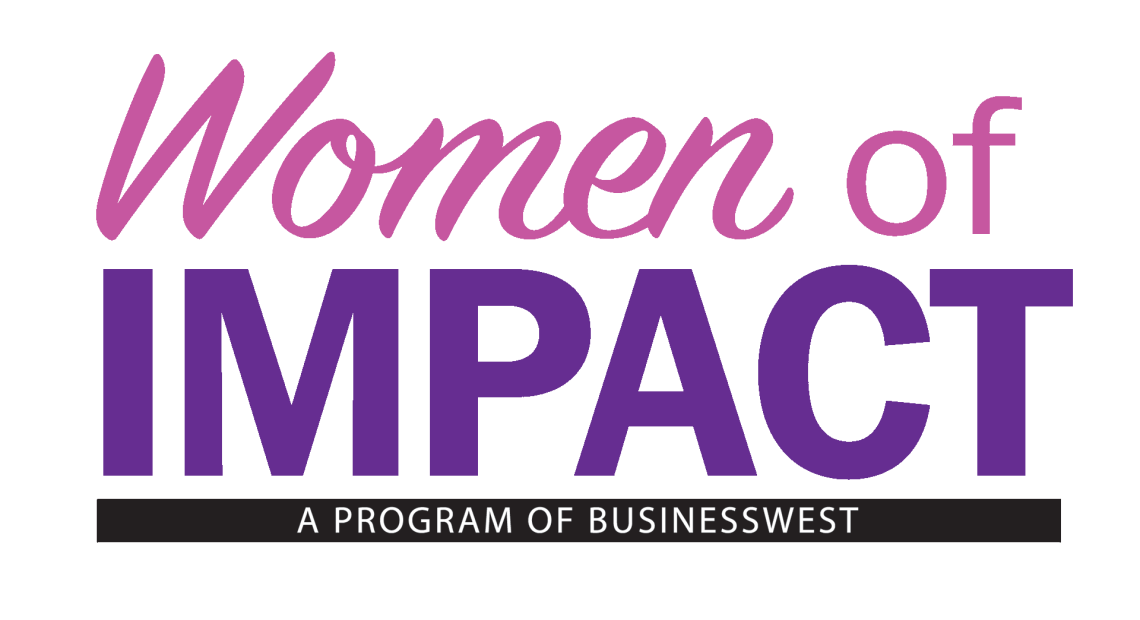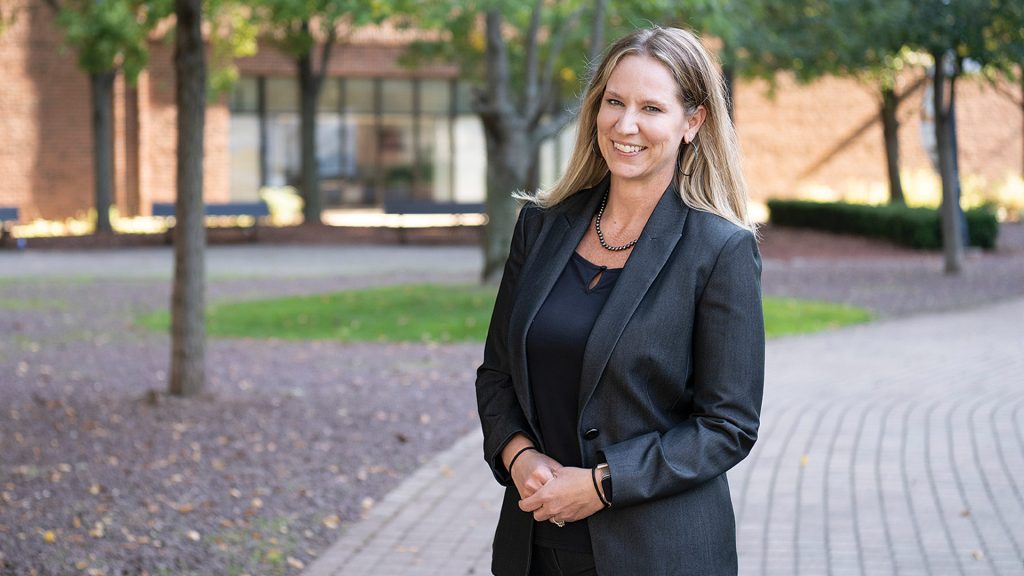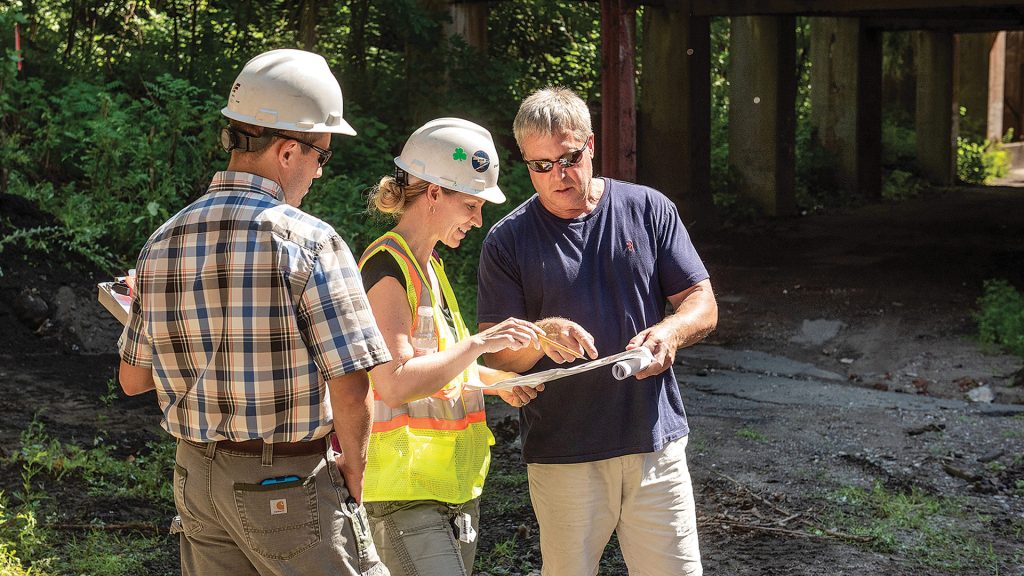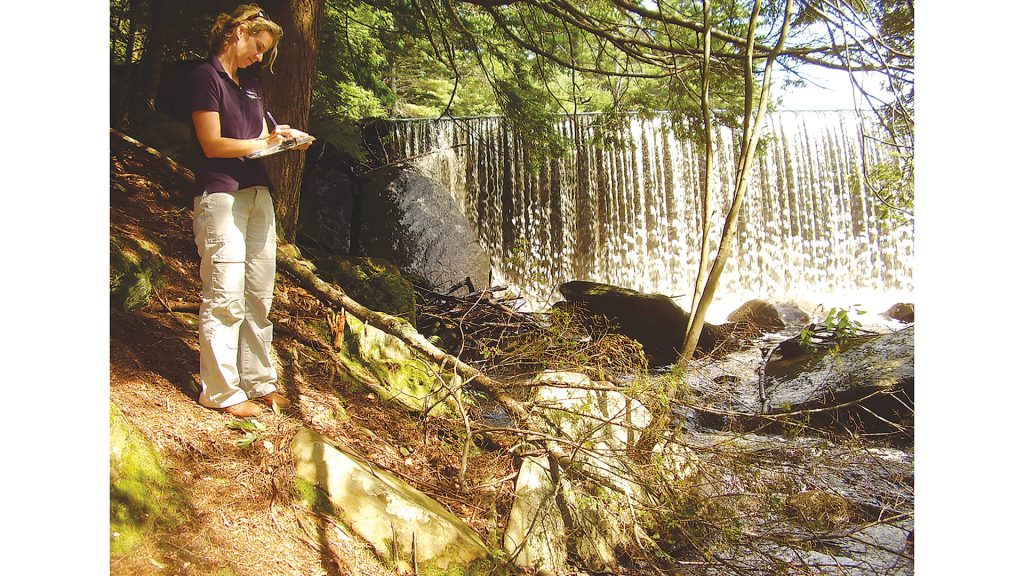
Ashley Sullivan
President, O’Reilly, Talbot & Okun
She’s Engineering Opportunities for Many in a Dynamic Field

When asked about being a leader and role model in her company and in her industry, Ashley Sullivan sums it up simply: “I like to help people, and a lot of people have helped me.”
And she knows the value of helping and encouraging others. During her college days and into her long engineering career at O’Reilly, Talbot & Okun (OTO) — after 20 years with the firm, she was named president at the start of 2020 — she sometimes questioned whether she knew enough, whether she measured up to her responsibilities, and to her peers.
It’s why events like a recent after-work gathering between OTO and Fuss & O’Neill, another civil-engineering firm headquartered in downtown Springfield, are valuable, she said, in that they help young engineers, and especially young women, not only network, but recognize their place in the field.
“I was intimidated to be in a room with a lot of people who had 20-plus years of experience on me. I always thought I had more to learn; I always thought I didn’t have as much experience as I needed,” she recalled. “But if you put me in a room with my peers, I would have been like, ‘oh, I can do this; I want to get them in situations where they see they’re good.”
“The big thing I stressed was, we all have value, and we’re all part of a team, and we need to be rowing the same way.”
Joining a small, newish engineering firm in 2000, Sullivan didn’t network much outside the company, but she sees the value in it now. “I didn’t know my path, and that’s something that’s true with a lot of people. But once they see you out there and you see yourself in that role, it just happens.”
The passion for inspiring younger engineers is what also drives Sullivan to be a mentor, not only by teaching a civil-engineering capstone design course at Western New England University, where she guides graduating students through a mock building project, but by encouraging OTO’s team members to seek any professional-development opportunities that will help them learn and advance, like she did.
“I think we should be mentors. I think it’s very important to give back to the industry,” she said. “We want to hire, and sometimes you hear complaints that there’s nobody great to hire, but is anyone helping them succeed? I think it’s our responsibility to do it.

“If you give people a lot of opportunity and the skills to help them move up, I feel that benefits the company itself,” she added. “The company needs to support the development of those skills.”
And hiring and recruitment are definitely a challenge now, Sullivan said, adding that the firm saw some turnover during the pandemic but has hired seven employees since January. “We’ve been able to navigate it so far. That’s why I also think it’s important to be a mentor and reach out to students and to have the kind of culture that appeals to them.”
Sullivan has certainly navigated some transitions over the past few years, from taking the reins at OTO to almost immediately having to steer it through a pandemic. For successfully leading in what is still a male-dominated field, and for being a mentor, role model, and inspiration to the next generation of civil engineers, Sullivan is certainly a Woman of Impact.
Ninth Time’s the Charm
Engineering runs in Sullivan’s family — sort of. She said her grandmother always had a lot of respect for engineers, and her father is one of eight siblings who tried engineering but didn’t stick with it. “My grandmother really wanted one, so I said I’ll try it.”
The truth is, Sullivan had already cultivated an interest in chemistry in high school and was considering studying environmental engineering at UMass Amherst — a place where, again, her insecurity nagged at her.
“I want to set us up to the next transition, and that means giving people the skills to manage and lead — not just engineering skills, but all those other things that have to happen. Communication is a big thing we work on, and so is trust.”
“I did very well in high school, but I was nervous about going to a challenging school, or a school where there were others who would do really well too. That plays into why I like to give people confidence and why I do what I do. On the outside, I did well and came across like I had a lot of confidence. But inside, I was like, ‘I don’t know what I’m doing. I have no idea.’”
She had a positive experience at UMass, though she shifted gears toward civil engineering, “mainly because I found that chemical engineering students ended up in a dark lab, and civil engineering students were outside in the quad, and that just looked a lot more enjoyable to me.”
When she graduated in 1998, a lot of the jobs being offered at the time were at the Big Dig in Boston, and she wasn’t interested in heavy construction, so she stayed in graduate school, where she gained the experience she would put to use at OTO two years later.
“I was working for a Mass Highway project where we were installing wells, doing groundwater sampling, modeling groundwater flow, looking at contamination, and two years later I had my master’s in environmental engineering,” she said. “I interviewed at OTO because they were local, in Springfield, and halfway through the interview with Jim Okun and Mike Talbot, I thought I’d like to work there. It was a small firm, everybody seemed very nice, and it seemed to suit my personality.”
OTO’s services over the years have included testing commercial properties for hazardous materials and overseeing cleanup, asbestos management in schools and offices, brownfield redevelopment, indoor air-quality assessments, and geotechnical engineering, a broad term encompassing everything from helping developers assess how much force and weight the ground under a proposed structure can stand to determining the strength of a building’s foundation and surrounding topography.
“I enjoyed working for a small company, working directly with the principals,” Sullivan said, the third being Kevin O’Reilly. “I learned a lot. I also enjoyed working in my own community. It’s been fun over the years driving around the neighborhoods, whether I go to Baystate for a doctor’s appointment or a library, or take my kids to a park, and see projects that I worked on. Rather than working on a high-profile job in another city, I really liked that the jobs were near where I work.”
The other positive experience — one that would later color the kind of president she would be —was being allowed a flexible schedule when she started a family in 2005.
“That was not industry-wide; it’s just not something that was offered,” she explained. “I went down to 24 hours with my first daughter, and I stayed there until they were both in school, then went to 32 hours. But I was still allowed to progress in management.”
That was the key, she said — being able to have work-life balance without sacrificing future opportunities.
“It’s a two-way street. I got some flexibility, but there was accountability and good communication, and I would try to be available when I absolutely needed to; my kids went to some job sites. That was something you couldn’t easily find at other engineering firms. And I also kept progressing; I was allowed to manage projects and manage staff that way. So that kept me going here, to the point where we transitioned.”

In fact, when the three founders started talking about the next generation of leadership, they discussed selling OTO to an outsider, but they preferred an internal transition, and felt they had the right individual in Sullivan.
“We had a good business, we had a good foundation, and I just said, ‘I want to be part of it … I like what I do, I like the people I work with, we have a good company, let’s just try to make this work.’”
Sullivan has taken lessons from her own experience and saw how offering flexibility in different ways to employees could benefit both them and the company, although COVID, admittedly, helped that process along. “I wanted to make sure people, whether managers or other individuals, had the skills and knew the expectations to make that kind of work more widespread.”
She has led her team, she noted, according to the company’s core values, three of which are transparency, respect, and togetherness.
“The big thing I stressed was, we all have value, and we’re all part of a team, and we need to be rowing the same way,” she told BusinessWest. “That was really important, and it was something I learned here but I saw fall away a little bit when we were going through the transition, because when times get hard, it becomes very individual: ‘what does this mean for me? Is this going to be good or bad? I’ve got to fight for my own.’ We needed to come back together.”
So she conducted sessions where she asked employees what kind of culture they want and what keeps them at OTO. “I asked, ‘what are some of the great things we can build upon? What can we do better?’ I think that was important. I like to hear what others want, and then see if I can help make that happen. So, really, one of the big things I wanted to do was to hear from more voices.
“And there was a good foundation,” she added. “My experience here was something I thought I could build upon and then bring to the next level.”
Reaching New Heights
The mission statement posted in the conference room attests that “we will elevate our industry to create and deliver the best solutions for natural and built environments.”
And to elevate an industry, Sullivan believes she must first elevate her people. “I want to set us up to the next transition, and that means giving people the skills to manage and lead — not just engineering skills, but all those other things that have to happen. Communication is a big thing we work on, and so is trust.”
When she talks to young people about a career in civil engineering, she’s quick to explain how much variety and opportunity they will encounter. “You can go into transportation or structural or geotech or environmental. You can do public work at the state or municipal level, or even the federal level. You can work in private consulting or go into technical sales. You can go into a testing lab. You can work for a contractor. That allows for some flexibility because you don’t always know when you’re right out of school and you have to make all these decisions.”
At the same time, “going into a field like civil engineering, you’re going to be needed forever. We do important projects for people. It’s important for people to have that job security and know there are so many different things you can do with that.”
The message is rersonating, especially with young women. A few weeks ago, Sullivan attended a geotechnical conference in Connecticut and was “blown away” by the number of women she saw, compared to, say, five years ago. And on a heavy construction site on Boston Road recently, she walked the grounds alongside a female field engineer and a female quality-control engineer, all from different firms.
“That was something that I hadn’t seen, to see three women working together on a project with a big rig installing ground improvement. It was really neat. Sometimes I think, ‘wow, this is happening.’
It’s happening because of the impact of women like Sullivan, who knows the value of being helped and inspired, and wants to do the same for others.
George O’Brien can be reached at [email protected]





